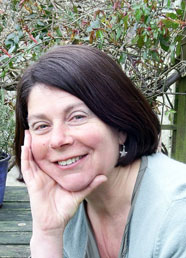Julia Green excels at writing coming-of-age stories that deal with love, loss, family and relationships. Here she tells Writers & Artists how she manages the tricky balance between working as an author and a lecturer.

Inside my head are:
* Night-time: summer, a hebridean island. A seventeen year old boy who’s gone missing, and a girl of fifteen looking for him …
* Applications to the MA
* Entries to a writing competition for young people for a local school
* Proposal for an international conference; two articles and a blog interview; author website updates for new novels
* Thoughts about a ‘tradition’ of writing for adolescents which deals with the inner life/emotions of teenage girls for my PhD
* The hebridean island again. Finn ( the boy): his backstory. He disappeared before, from school. Why? His family are anxious about him … Do I need to explain more of this earlier in the novel?
* (food shop for weekend return of student son) …
It’s perfectly possible to switch at the click of a mouse between my job as ‘author’ and my job as ‘university lecturer’ - not when I’m teaching, of course, but for the other large part of my work which involves running the specialist MA Writing for Young People. I’m lucky to have two jobs I love, but the balancing act isn’t always straightforward. This particular week, I’m desperate to immerse myself totally in the world of the novel I’m writing about a group of young people on an island in the Hebrides, due with my publishers in two months’ time. I’ve written 41,000 words … the end is almost in sight.
My university job depends on me being a published writer. I love teaching my MA students – talking about character, structure, style, helping them to bring the story onto the page, honing, editing, re-drafting: the processes I know so well from the inside, as a practitioner. And it’s a great thrill when they do so well (authors Lucy Christopher, Sally Nicholls, Gill Lewis, Elen Caldecott, Jim Carrington, Marie-Louise Jensen are among my former students ) – some much better than me if we’re talking big prizes and book sales. Do I mind? Not when I think of the bigger story we’re all involved in (getting children reading, creating readers for the future). It gives me genuine pleasure to see them succeed. I do sometimes wonder what might have happened if I’d had someone helping me earlier on; if I’d been able to write full-time; if my head wasn’t full of other people’s stories as well as my own! Mostly I thank my lucky stars that I’m doing what I always dreamed of: writing novels. Having my academic job makes that possible.
Julia’s new novel is Bringing the Summer, published by Bloomsbury Children’s Books
Follow me on Facebook www.facebook.com/JuliaGreenAuthor
Find out more about the MA Writing for Young People at www.bathspa.ac.uk
Hi Julia.
I am an aspiring author who is in the process of doing another thorough edit of my first novel.
'Finn ( the boy): his backstory.'
I believe it is unwise to leave the reader to much in the dark. Hints, indications and explanations are vital signposts and landmarks. It is a question of balance between the tension and drama in the plot and storyline. To maintain an element of mystery and keep the pages turning it is best not to spill all-the-beans. But the reader has to be given enough information to understand each situation, and to surmise as to what is about or will happen in the following chapters.
There could be many reasons why Finn has disappeared from school before. Finn could have urgent business elsewhere on the island. He maybe being bullied at school. A teacher might be physically or mentally abusing him.
Why are his family anxious about Finn. Does Finn have a medical disorder? Is his families anxiety genuine? Does Finn have a happy home life?
I am interested in your views on creativity as an innate ability. Have your most successful students been those who are naturally creative?
Many people that are not naturally gifted have gone on to have successful careers as writers. No-one was born a journalist.
As an aspiring writer, I do question the value of non-university creative writing courses. How can these profit making ventures give value for money, if the teachers have to many students?
Does working with students on a one-to-one basis mean there are limits, as to how many students you have in a class?
I am interested when you say, 'I do sometimes wonder what might have happened if I’d had someone helping me earlier on.'
How did you get started writing, and who were your biggest influences?
Good luck with your novel and PhD.